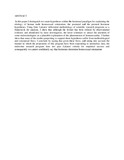| dc.contributor.author | Mbugua, Karori | |
| dc.date.accessioned | 2013-06-29T08:34:39Z | |
| dc.date.available | 2013-06-29T08:34:39Z | |
| dc.date.issued | 2005 | |
| dc.identifier.citation | International Society for the History, Philosophy, and Social Studies of Biology 07/15/2005, Guelph | en |
| dc.identifier.uri | http://ishpssb.org/wp-content/uploads/2012/06/viewabstract_089.html | |
| dc.identifier.uri | http://hdl.handle.net/11295/42191 | |
| dc.description.abstract | In this paper I distinguish two main hypotheses within the hormonal paradigm for explaining the etiology of human male homosexual orientation: the postnatal and the prenatal hormone hypotheses. Using Imre Lakatos' influential methodology of scientific research programs as a framework for analysis, I show that although the former has been refuted by observational evidence and abandoned by most investigators, the latter continues to attract the attention of some endocrinologists as a plausible explanation of the phenomenon of homosexuality. I further show that some of the studies purporting to support these hypotheses suffer from methodological and conceptual flaws. I conclude by saying that given these flaws, and taking into account the manner in which the proponents of this program have been responding to anomalous data, the endocrine research program does not pass Lakatos' criteria for empirical success and consequently we cannot confidently say that hormones determine homosexual orientation | en |
| dc.language.iso | en | en |
| dc.title | Explaining Sexual Orientation: A Lakatosian Appraisal of the Endocrine Research Program | en |
| dc.type | Presentation | en |
| local.publisher | Department of Philosophy, University of Nairobi | en |

